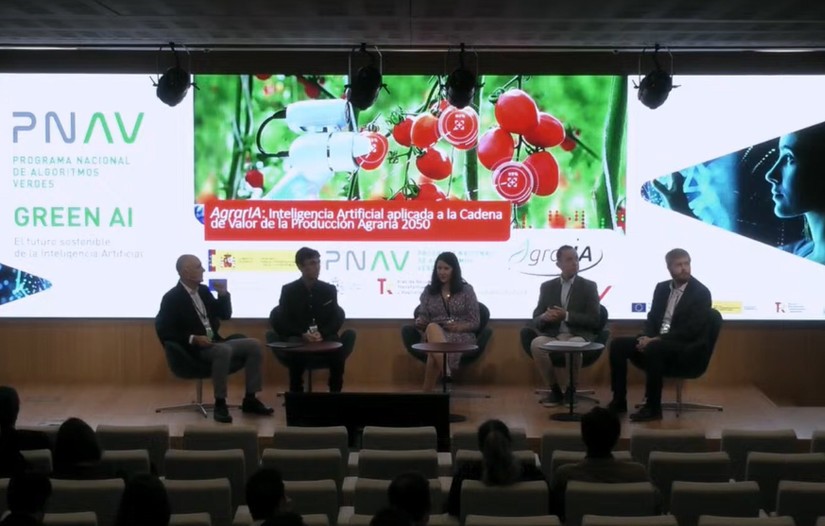GMV presents real-life cases of artificial intelligence as a driver of agricultural sustainability

At the “GREEN AI: The Sustainable Future of Artificial Intelligence” event organized by Spain’s Ministry for Digital Transformation and Public Service, Miguel Hormigo, manager of GMV’s Industry Sector, highlighted the key role of artificial intelligence in the future of sustainable agriculture and presented the AgrarIA project, which uses artificial intelligence applied to the agricultural production value chain with the goal of transforming the Spanish agrifood sector through a shift to a more sustainable and technologically advanced model. This industrial research project, funded by the Ministry for Digital Transformation and Public Service, seeks to develop a sustainable global agricultural industry with a carbon-neutral footprint, using cutting-edge technologies such as artificial intelligence, robotics, and bioengineering to identify new agricultural production methods.
The project includes the development of a data space called AgrarIA that will be based on AI services and will bring together all the models of the agricultural value chain—production, processing, and distribution—in a single decoupled computing entity, allowing for the implementation of unique initiatives that will support a rapid, efficient, productive, and sustainable transformation of the agrifood sector in the medium term. Hormigo emphasized how these technologies enable smarter resource management, in line with the goals of the National Green Algorithms Program (PNAV) presented at the conference. AgrarIA has specific development activities, within its work packages, for researching green algorithms applied to the data space and to different use cases developed by the project’s partners. The project also emphasizes the pursuit of efficiency in the consumption of computational resources in order to be even more sustainable, all in line with two of the sector’s main challenges: competitiveness and productivity.
One of the other core research goals of the project involves modeling through different use cases of this data space, to demonstrate its validity as an interoperable, sustainable, and secure platform. As such, Hormigo’s presentation showed some examples of these use cases that are being developed by all the partners in the consortium: improved calculation of wine vintage capacity, energy efficiency in refrigeration plants, detection and rapid elimination of pests in tomato plantations in greenhouses, computer vision in supermarkets to improve customer experience through fruit identification in checkout lines, quantum computing applied to satellite images, water efficiency in large farms, and more.
One example is the partnership with TEPRO, where prediction models have been to calculate the water content available in the soil for crops, using key variables such as precipitation and evapotranspiration. These models make it possible to predict crop water requirements, thus optimizing the use of irrigation. On an almond farm in town of Carmona in Seville province, the results were impressive, achieving savings of up to 58% in irrigation water, a significant improvement in the sustainability of water resource use.
GMV and Familia Torres have also been working on a project to predict the number of grapes entering the winery by combining satellite imagery and agroclimatic information. The AI they’ve developed not only helps to better manage Familia Torres’s own productions but also facilitates monitoring of third-party forecasts, optimizing the purchase of grapes and other harvest-related processes.
In collaboration with the Spanish National Research Council (CSIC), GMV is carrying out a pilot test of quantum artificial intelligence to predict the yield of agricultural crops. This initiative uses processed satellite images to generate a predictor based on Quantum Machine Learning (QML), which allows for more accurate yield prediction. Other data such as climate and associated risks are also integrated, expanding the prediction model to offer a more comprehensive and efficient vision.
The AgrarIA Project: ARTIFICIAL INTELLIGENCE APPLIED TO THE AGRICULTURAL PRODUCTION VALUE CHAIN 2050 (TSI-100114-2021-0) project is funded by Spain’s Ministry for Digital Transformation and Public Service, through the 2021 R&D Missions in Artificial Intelligence program, within the framework of the Digital Spain 2025 Agenda and the National Artificial Intelligence Strategy, with European Union funding through the Recovery, Transformation, and Resilience Plan.
